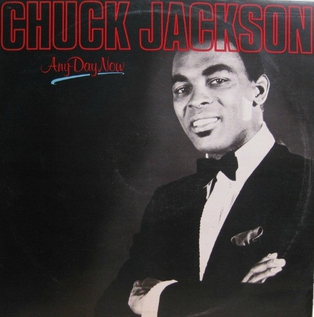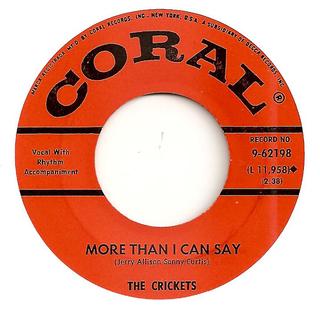
Rosco N. Gordon III was an American blues singer, pianist, and songwriter. He is best known for his hit songs "Booted," (1952), "No More Doggin'" (1952), and "Just a Little Bit" (1960). Gordon was a pioneer of the Memphis blues style. He played piano in a style known as the "Rosco rhythm," with the emphasis on the off-beat. This rhythm was an influence on later musical styles.

"Do You Love Me" is a rhythm and blues song recorded by the Contours in 1962. Written and produced by Motown Records owner Berry Gordy Jr., it appeared twice on the Billboard Hot 100 chart, reaching numbers three in 1962 and eleven in 1988.
"Ain't Nobody's Business" is a 1920s blues song that became one of the first blues standards. It was published in 1922 by Porter Grainger and Everett Robbins. The song features a lyrical theme of freedom of choice and a vaudeville jazz–style musical arrangement. It was first recorded, as "'Tain't Nobody's Biz-ness if I Do", in 1922 by Anna Meyers, backed by the Original Memphis Five.
The Wonder Who? was a nom de disque of The Four Seasons for four single records released from 1965 to 1967. It was one of a handful of "names" used by the group at that time, including Frankie Valli and The Valli Boys. Wonder Who? recordings generally feature the falsetto singing by Valli, but with a softer falsetto than on "typical" Four Seasons recordings.

"Go Away Little Girl" is a popular song written by Gerry Goffin and Carole King. It was first recorded by Bobby Vee for Liberty Records on March 28, 1962. The lyrics consist of a young man asking a young attractive woman to stay away from him, so that he will not be tempted to betray his steady girlfriend by kissing her. The song is notable for making the American Top 20 three times: for Steve Lawrence in 1963, for The Happenings in 1966, and for Donny Osmond in 1971. It is also the first song, and one of only nine, to reach US number 1 by two different artists.
"(Now and Then There's) A Fool Such as I" is a popular song written by Bill Trader and was published in 1952. Recorded as a single by Hank Snow it peaked at number four on the US country charts early in 1953.
"Big Boss Man" is a blues song first recorded by Jimmy Reed in 1960. Unlike his most popular songs, the songwriting is credited to Luther Dixon and Al Smith. It was a hit for Reed and has been identified as an influential song. Elvis Presley and B.B. King also recorded hit versions of the tune.
"He'll Have to Go" is an American country and pop hit recorded on October 15, 1959, by Jim Reeves. The song, released in the fall of 1959, went on to become a hit in both genres early in 1960.
Mel London was an American songwriter, record producer, and record label owner. He was active in the Chicago blues and R&B scenes in the 1950s and 1960s. London is best known for his compositions for Chicago blues artists Howlin' Wolf, Muddy Waters, Elmore James, and Junior Wells as well as being the record producer and owner of Chief Records.

"Any Day Now" is a popular song written by Burt Bacharach and Bob Hilliard in 1962. It has been recorded by numerous artists over the years, including notable versions by Chuck Jackson in 1962, Alan Price in 1965, Elvis Presley in 1969, and Ronnie Milsap in 1982. The lyrics of this song predict the eventual demise of a romantic relationship the lyricist is in with an unnamed person whom the lyricist believes will get away one day and leave the lyricist with feelings of sadness and emptiness for the rest of his/her life.

"More Than I Can Say" is a song written by Sonny Curtis and Jerry Allison, both former members of Buddy Holly's band the Crickets. They recorded it in 1959 soon after Holly's death and released it in 1960. Their original version hit No. 42 on British Record Retailer Chart in 1960. It has been notably performed by singers Bobby Vee, Leo Sayer, and Sammy Kershaw.
"Tramp" is a soul blues song with funk elements, written by West Coast blues artists Lowell Fulson and Jimmy McCracklin. First recorded by Fulson in 1967, it was his highest-charting single since "Reconsider Baby" in 1954. The song is partly narrative, with the singer ignoring the criticism of his unsophisticated appearance:
"Leave My Kitten Alone" is a 1959 R&B hit, written by Little Willie John, Titus Turner and James McDougal, first recorded by Little Willie John. The song follows a 24-bar blues format.
"Every Beat of My Heart" is a rhythm and blues song by Johnny Otis. It was first recorded in 1952 by his group, The Royals.

"Just Your Fool" is a rhythm and blues-style song written and recorded by the American jazz and jump blues bandleader/pianist Buddy Johnson and His Orchestra in 1953. Called an "R&B anthem", the song has a big-band arrangement and his sister Ella Johnson on vocals—her "delicate and deceptively sweet phrasing was ideally suited to ballads such as this". "I'm Just Your Fool" became a Billboard R&B chart record hit, reaching number six in 1954.

"Baby What You Want Me to Do" is a blues song that was written and recorded by Jimmy Reed in 1959. It was a record chart hit for Reed and, as with several of his songs, it has appeal across popular music genres, with numerous recordings by a variety of musical artists.
"Devil or Angel" is a song written by Blanche Carter and originally recorded by the Clovers in 1955, where it went to number four on the US R&B Best Sellers chart. It was re-recorded by John Bailey after he left the Clovers and formed another Clovers group for Lana Records in 1965.

Columbus S. Perry, better known as Piney Brown, was an American R&B and blues singer and songwriter, who has been described as a "fine, big-voiced shouter". He released a string of singles between 1948 and 1988 and issued two albums late in his career. His songs have been recorded by Little Milton and James Brown.
Otha Lee Moore, better known as Tiny Topsy, was an American R&B singer. The music journalist, Mark Lamarr, noted "Tiny in the same spirit you'd call a bald man curly, Tiny Topsy definitely had the lungpower to match her name." She was five feet tall and weighed 250 pounds.

"No More Doggin'" is a rhythm and blues song written and originally recorded by blues musician Rosco Gordon in 1952. The song featured Gordon's signature "Rosco Rhythm" piano style which became a precursor to Jamaican ska music.









